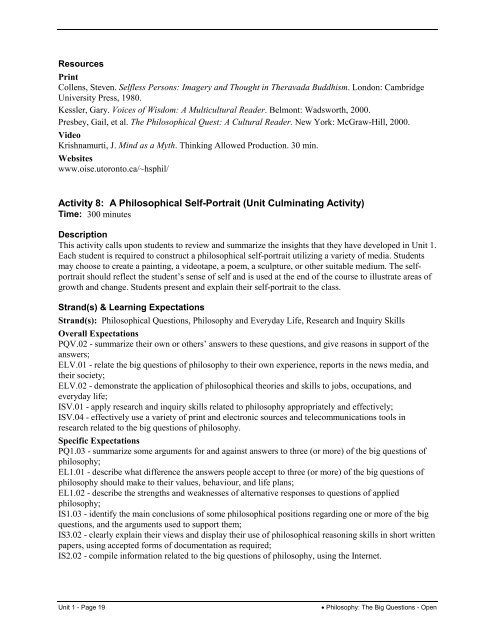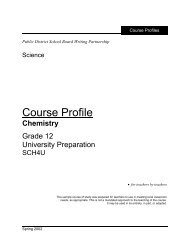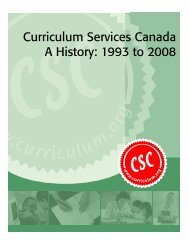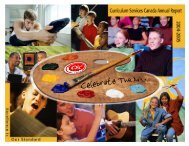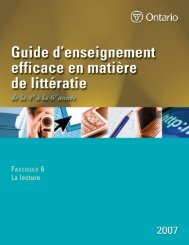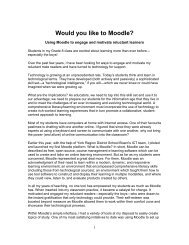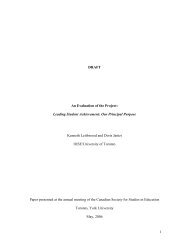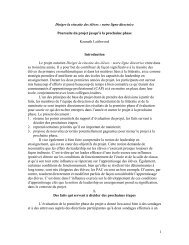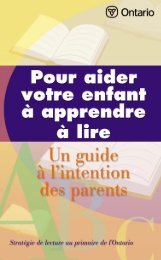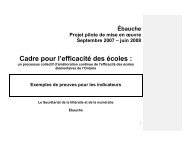Course Profile - Curriculum Services Canada
Course Profile - Curriculum Services Canada
Course Profile - Curriculum Services Canada
Create successful ePaper yourself
Turn your PDF publications into a flip-book with our unique Google optimized e-Paper software.
Resources<br />
Print<br />
Collens, Steven. Selfless Persons: Imagery and Thought in Theravada Buddhism. London: Cambridge<br />
University Press, 1980.<br />
Kessler, Gary. Voices of Wisdom: A Multicultural Reader. Belmont: Wadsworth, 2000.<br />
Presbey, Gail, et al. The Philosophical Quest: A Cultural Reader. New York: McGraw-Hill, 2000.<br />
Video<br />
Krishnamurti, J. Mind as a Myth. Thinking Allowed Production. 30 min.<br />
Websites<br />
www.oise.utoronto.ca/~hsphil/<br />
Activity 8: A Philosophical Self-Portrait (Unit Culminating Activity)<br />
Time: 300 minutes<br />
Description<br />
This activity calls upon students to review and summarize the insights that they have developed in Unit 1.<br />
Each student is required to construct a philosophical self-portrait utilizing a variety of media. Students<br />
may choose to create a painting, a videotape, a poem, a sculpture, or other suitable medium. The selfportrait<br />
should reflect the student’s sense of self and is used at the end of the course to illustrate areas of<br />
growth and change. Students present and explain their self-portrait to the class.<br />
Strand(s) & Learning Expectations<br />
Strand(s): Philosophical Questions, Philosophy and Everyday Life, Research and Inquiry Skills<br />
Overall Expectations<br />
PQV.02 - summarize their own or others’ answers to these questions, and give reasons in support of the<br />
answers;<br />
ELV.01 - relate the big questions of philosophy to their own experience, reports in the news media, and<br />
their society;<br />
ELV.02 - demonstrate the application of philosophical theories and skills to jobs, occupations, and<br />
everyday life;<br />
ISV.01 - apply research and inquiry skills related to philosophy appropriately and effectively;<br />
ISV.04 - effectively use a variety of print and electronic sources and telecommunications tools in<br />
research related to the big questions of philosophy.<br />
Specific Expectations<br />
PQ1.03 - summarize some arguments for and against answers to three (or more) of the big questions of<br />
philosophy;<br />
EL1.01 - describe what difference the answers people accept to three (or more) of the big questions of<br />
philosophy should make to their values, behaviour, and life plans;<br />
EL1.02 - describe the strengths and weaknesses of alternative responses to questions of applied<br />
philosophy;<br />
IS1.03 - identify the main conclusions of some philosophical positions regarding one or more of the big<br />
questions, and the arguments used to support them;<br />
IS3.02 - clearly explain their views and display their use of philosophical reasoning skills in short written<br />
papers, using accepted forms of documentation as required;<br />
IS2.02 - compile information related to the big questions of philosophy, using the Internet.<br />
Unit 1 - Page 19<br />
• Philosophy: The Big Questions - Open


